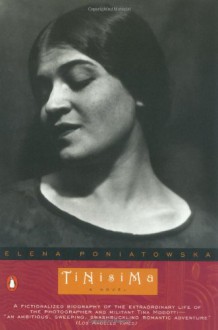
Before reading this novel, what I knew of Tina Modotti came from a single Edward Weston photograph. A beautiful woman with penetrating eyes.
Once I began to read "TINISIMA", I became utterly captivated with the life of Tina Modotti. Elena Poniatowska has a way of making the narrative read as if Tina Modotti herself were relating various happenings from her life to the reader, while the author adds her own commentaries as a supplement.
The more I read of this novel, the more I found myself curious about this woman and her life. It got to the point that I could hardly tear myself away from finishing this novel, though it pained me to see how Miss Modotti was manipulated and abused both by some of her friends/compatriots and the Stalinist system she once served so faithfully. I believe it was a mistaken faith, but I respect Miss Modotti for the courage of her convictions. She had good intentions, a big heart, but was prone to blind herself to the evils of Stalinism. Therein lies the ultimate tragedy of her life.
Tina Modotti could have gone on to become one of the greatest photographers of the last century had she not threw herself wholly into Marxist/Stalinist politics. Perhaps it is for that reason that she is not widely known today.
I wish I could have known Tina Modotti. I would have loved to have had lots of conversations with her in some café or small restaurant. While I'm sure we would not agree on a number of issues, I like to think we would have become close friends.
Thank you, Elena Poniatowska, for a beautiful book.

 Log in with Facebook
Log in with Facebook 






